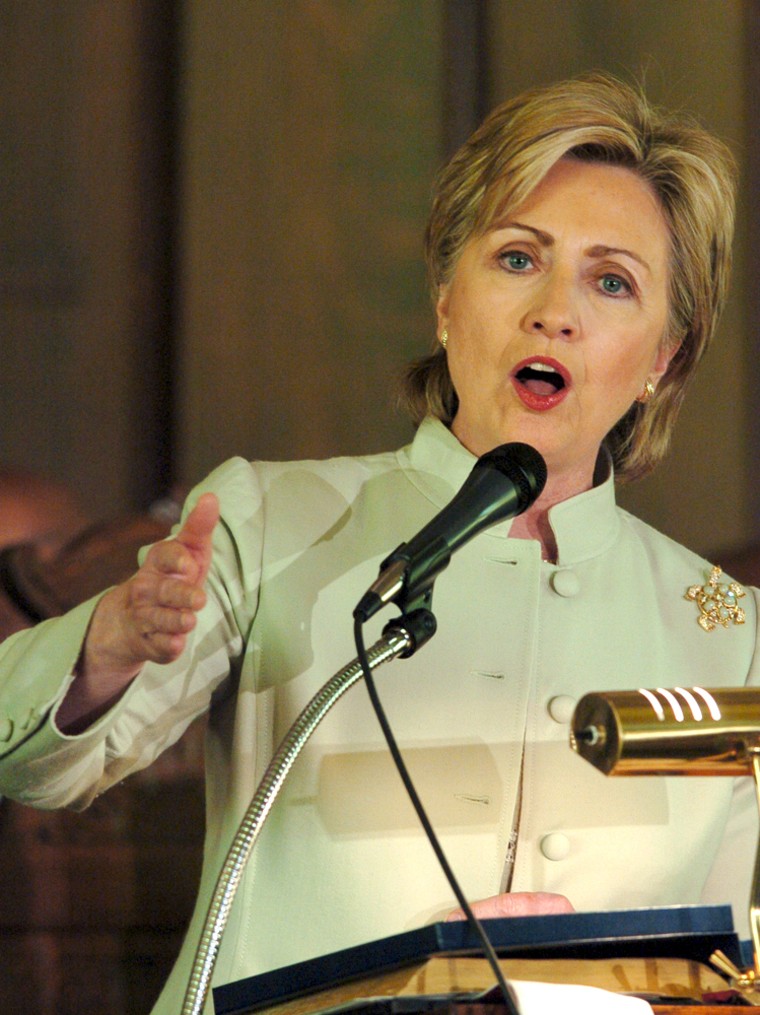New York Sen. Hillary Rodham Clinton used her speech to the New Hampshire Democratic Party's "100 Club" Saturday night to preview what aides say will closely resemble her presidential campaign stump speech.
Punctuated with a "you are invisible" refrain, Clinton charged that "President Bush and the Washington Republicans" have chosen to ignore group after group, including struggling single parents, small-business owners, Hurricane Katrina victims, first responders and wounded soldiers returning from combat.
Before a sold-out fundraiser of 1,000, Clinton named a total of 14 groups she saw as being ignored, which included 46 million people living without health insurance, 13 million children living in poverty and students in failing schools that are underfunded by Bush's No Child Left Behind law.
But, she also included career government scientists warning about global warming, government accountants looking into no-bid contracts, and even "a Republican U.S. attorney trying to enforce the law impartially."
"They tried to make you invisible to the rest of us," Clinton told her audience, concluding that "for six long years, they have all been invisible. Well, they're not invisible to us. They're not invisible to me. And when we retake the White House, they will no longer be invisible to the president of the United States."
Indeed, unlike former North Carolina Sen. John Edwards, a rival for the Democratic nomination, Clinton avoids a "two Americas" theme and instead focuses her attention on the middle class and her attacks largely on Bush, his administration, and Republicans in general.
Edwards caters his speeches more to the "have-nots"; giving voice to those who have not enjoyed the fruits of the economic recovery. It's a more traditional populist or liberal message.
Clinton's only swipes against any entity other than Bush and Republicans were against oil companies' record profits, though none were named, and companies "who outsource your job, or lay you off or end the promise of your pension" -- again, with none named. Her speech is more classically Democratic, but certainly not the left wing of the Democratic Party.
Clinton's speech was very good and well-written, but it's interesting that while there are plenty of built-in, strong applause lines -- enough for her husband and many other talented speakers to take the roof off the building -- she quite deliberately does not punch them hard.
The "you are invisible to them" line that many would shout, she states firmly, but without histrionics. By shouting the applause line after each attack, a woman would run the risk of sounding shrill, so Clinton dials it back, making the point but not milking it for all it is worth, like her husband and so many others would.
She did not talk long about the war in Iraq but reiterated her opposition to Bush's troop surge and said, "we finally have to start bringing them home and caring for them and their families."
The question of whether Clinton should apologize for her 2002 vote in favor of giving Bush the authority to go to war in Iraq did not appear to come up as she mingled with people inside and outside of Swan Chocolates and Desserts in downtown Nashua earlier in the day, sipping a hot chocolate after ogling but skipping the glass display of candies.
But gender might well be a factor there as well.
It wouldn't be hard to conclude that the first woman with a strong chance of getting elected president would not want to risk being perceived or portrayed as weak and indecisive by apologizing.
Rather, she has said she made the decision she made based on the evidence and intelligence that was available at the time, and that if she knew then what she knows today, she wouldn't have cast that vote.
In doing that, Clinton obviously writes off the hard-core anti-war vote, and gambles that a majority of Democrats and general election voters don't need or expect an apology.
The risk of an apology is greater than the benefit, and she probably wouldn't be inclined to apologize for it, anyway.
Watching Clinton and her operation at work, one gets a strong impression of an extremely competent, highly organized, very focused and enormously disciplined candidate and campaign, not going for home runs or even triples, but consistently punching out singles and doubles. No one was jumping up and down on chairs, or sobbing with emotion, but most seemed very favorably impressed.
A visible thread through this 2008 campaign is of romantic, idealistic voters on both sides.
Conservatives and even evangelicals are clutching to former New York City Mayor Rudy Giuliani's strength in leadership, seemingly oblivious of his positions on issues that have historically been of great importance to them.
And, on the Democratic side, we see Clinton's rival, Illinois Sen. Barack Obama, as the modern day John F. Kennedy, based on a projected image rather than a track record or experience.
Clearly Clinton is not trying to out-Kennedy Obama or play the passion card hard. She's playing her own game, solidly and competently, almost serenely, betting that Obama's aura will fade as the caucuses and primaries near.
